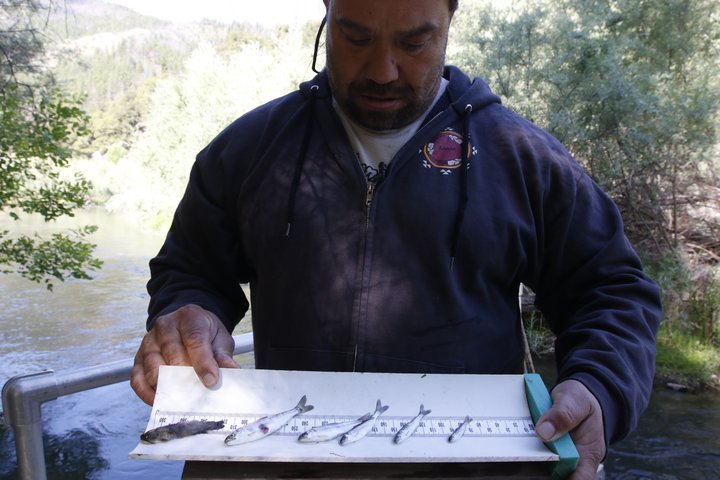
Studying the juvenile fish kill currently underway on the Klamath. Photo: Klamath Salmon Media Collaborative.
###
DOCUMENT:
###
Press release from the Karuk Tribe:
In response to record low precipitation in the Klamath Basin, the Karuk Tribe has declared a state of emergency. This emergency declaration acknowledges the reality that climate change is upon us, and the dangers that it poses to rivers, forests, wildlife and communities.
Hydrological conditions in the Klamath River Basin are the worst in modern history, although in recent years this has become an all-too-common refrain. Ecosystems and economies all along the California/Oregon border are strained to their breaking point. A massive fish kill is currently underway in the Klamath River that could result in losing an entire generation of salmon.
“Our monitoring traps are full of dead juvenile salmon. The few fish still alive are infected with disease. It’s a catastrophic blow to the fishery and Karuk culture,” said Toz Soto, Fisheries Program Manager for the Karuk Tribe.
The disease-causing parasite Ceratonova shasta (C. shasta) has been linked to Klamath salmon declines for decades. A complex of dams in the mid-Klamath disrupt natural flow patterns and cause warmer than normal water temperatures. This creates an ideal habitat for the parasite to flourish downstream of the dams. However; these dams don’t control how much water is in the Klamath River, that’s a function of how the Bureau of Reclamation (BOR) manages irrigation diversions from Upper Klamath Lake in Oregon, 50 miles upstream.
The current BOR operations plan calls for “flushing flows” to scour the river channel and dilute parasites during disease outbreaks. This year, historically low inflows to Upper Klamath Lake led BOR to rule out a flushing flow to the river.
“BOR’s decision to not provide flushing flows is allowing a massive juvenile fish kill to take place. Over 95% of sampled fish are infected. We have to keep as much water in the river as possible to allow some fish to survive,” continued Soto.
Officials have made drought declarations in the Klamath Basin in 8 out of the last 12 years. The Karuk Tribe says this year’s crisis is not an aberrant weather pattern but reflects a change in climate. “It’s time to face the reality of climate change which means we must change how we manage the Klamath’s water resources,” noted Karuk Chairman Russell ‘Buster’ Attebery. “We need long term solutions to adapt to this new climate immediately, or it will be the end for salmon and the cultures that depend on them.”
Tribal officials have asked congress provide disaster relief funds to all affected communities to address economic hardship, and ecological breakdown. In order to protect as many fish as possible, the Karuk Tribe urges state and federal agencies to broker temporary water transactions to keep critical stream reaches wet, but also point to long term solutions to recover fisheries and make the ecosystem resilient in the fact of climate change.
Some relief for salmon is on the horizon. An agreement is in place to remove the lower four Klamath River dams in 2023. The dams offer no irrigation diversions or flood protection and the parent company Berkshire Energy has agreed to removal. “Dam removal will improve water quality, disrupt the habitat for disease vectors, and allow salmon to access historic spawning grounds,” says Attebery. “We are praying the fish can hang on until then.”
CLICK TO MANAGE